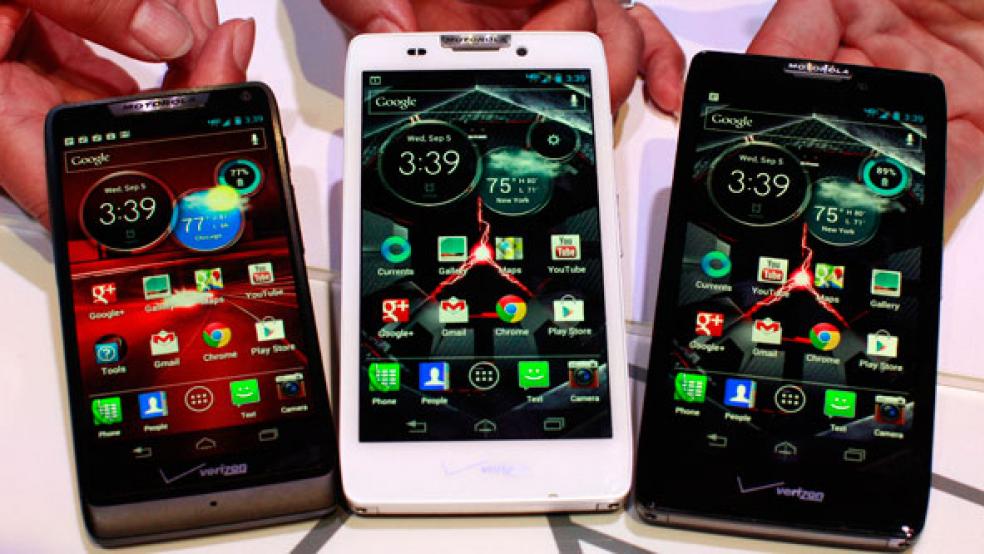The smartphone revolution is having a profound effect on the way we live. It is all but killing the fine art of conversation.
CBS’s “Sunday Morning” made the point in an eye-opening segment this week. It was part-riveting, part-alarming and altogether frightening, if you happen to fear that technology is having an ever-increasing role in the decay of such time-honored societal conventions as people talking to one another.
The use of smartphones “continues to climb in the U.S.,” the Nielsen company proclaimed in a recent survey. More than three out of five, or 61 percent, of mobile subscribers in the U.S. owned a smartphone over the three months from March to May of this year. That figure is up more than 10 percent since smartphones became a majority of the mobile handset market in early 2012.
Nielsen’s treasure trove of engrossing data shows just how deeply smartphones have penetrated our consumer culture. Overall, women comprise the majority of smartphone users, with three out of five using the instruments. The infiltration of smartphones came in lowest – at 42 percent – among Americans who were 55 and older. “But this group is catching up fast, as penetration among this demographic has nearly doubled over the past year,” Nielsen tells us.
Still, the smartphone craze is unquestionably driven by the young, underlining the belief that they more readily grasp such technological devices. The smartphone ownership rate was the highest (78 percent) among Millennials between the ages of 25 and 34. Similarly, three out of four mobile users aged 18 to 24 own smartphones.
So the smartphone revolution is clearly capturing America’s youth, and the anecdotal signs of its impact are everywhere. In New York last year, teenagers competed intensely in a contest to determine who was “America’s Fastest Texter.” A Wisconsin native walked off the $50,000 prize. A New Yorker cover captured the zeitgeist cleverly by depicting a family at the beach, with each member on his or her smartphone.
Sherry Turkle, a Massachusetts Institute of Technology psychologist and author, recognizes that young people profoundly prefer to communicate by text messaging, not something as 20th century as actually moving their lips. Turkle has ample street cred to make such pronouncements. She is a professor of social studies of science and technology at MIT and the founder and director of the MIT Initiative on Technology and Self. She has spent three decades studying our relationship to technology and has grown increasingly concerned that it has overtaken our day-to-day lives in an unhealthy and irrevocable manner. She’s also the author of “Alone Together: Why We Expect More From Technology and Less From Each Other.”
After years of research, Turkle comes armed with fascinating findings. One of her conclusions is that young people in particular tend to like themselves better in cyberspace than in real life, have higher self-esteem and prefer the online image they can project to the actual one.
“Online you become the self you want to be,” she told the Guardian newspaper last month. But then we risk losing the “raw, human part” of being with one another.
For instance, an 18-year-old boy summed up his generation’s point of view on what’s wrong with having a conversation: Talking “takes place in real time and you can’t control what you’re going to say,” she said on CBS’s “Sunday Morning.”
This portends a potentially bleak future for any young man or woman who has woefully incomplete communications skills. Everything in society is geared to one’s ability to speak effectively to other people. Texting is ultimately a poor substitute for conversation skills.
If young people today text as a way to avoid confrontation or criticism or show as basic an emotion as empathy, they could be doomed to living a unsatisfying life. You can imagine the disadvantage a social-media star that is socially inept will have when he or she goes on, say, a job interview and can’t look the prospective boss in the eye or show enough self-awareness to make small talk.
Of course, simply by walking down any city street today in the United States, you can draw some quick conclusions. Everyone is connected to something, if not one another. We love our smartphones, no doubt about it.
So, what does it all mean? Is it bad? Or good? Or simply inevitable?
As Nielsen and academics and Apple are finding out, our society may have already reached a point when we love our smartphones more than we love each other.






